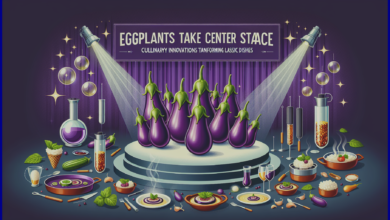Brussels Sprouts: The Nutritional Powerhouse You Didn’t Know You Loved

Brussels Sprouts: The Nutritional Powerhouse You Didn’t Know You Loved
Introduction
Ah, Brussels sprouts! Those little green orbs that can inspire equal parts enthusiasm and dread among dinner guests. Once relegated to the sidelines of holiday dinners or dismissed as the bane of many a childhood vegetable plate, this cruciferous gem is enjoying a resurgence in the culinary spotlight. Particularly in the USA, where these nutrient-packed morsels are both widely available and increasingly popular, Brussels sprouts stand tall (or rather, small) as a formidable ally in your quest for a healthier lifestyle. But why is this pint-sized powerhouse climbing the ranks of superfoods? Let’s delve into the delightful depths of Brussels sprouts and unravel the secrets to their immense appeal.
Description
Brussels sprouts, scientifically known as Brassica oleracea gemmifera, originated from the Mediterranean region, specifically in what is now Belgium, hence their name. Picture fields of vibrant green foliage, with these miniature cabbages adorning the stalks like nature’s own garland of goodness. Typically, they present with a glossy green exterior, although you may stumble onto varieties showcasing purple hues.
Their flavor profile is quite unique: a slightly nutty, sweet essence with a hint of bitterness that seems to intensify with roasting—your oven’s best-kept secret! In the USA, the prime growing season for Brussels sprouts kicks off in late summer and runs through early winter, with peak harvesting around Thanksgiving—perfect for festive feasts! An intriguing tidbit? During World War II, they were an integral part of rations, ensuring the nutrition of troops amid tough times.
Health Benefits
Hold onto your forks! When it comes to nutrition, Brussels sprouts are nothing short of a powerhouse. Bursting with essential nutrients, they’re rich in vitamin C, vitamin K, folate, and fiber, not to mention an impressive array of antioxidants known to wage war against oxidative stress. These tiny veggies play a vital role in supporting heart health, promoting healthy digestion, and even aiding weight loss— thanks to their low calorie count and high fiber content.
Scientific studies suggest that regular consumption of cruciferous vegetables like Brussels sprouts can contribute to reduced inflammation and improved gut health. Experts emphasize their effectiveness in combating chronic diseases, making sprouts not just a healthy addition, but a potent shield for your well-being.
How to Use
Now that you’re convinced of their health benefits, how do you glide these gems into your daily meals? Let your imagination run wild! From tossing them into salads fresh off the vine to roasting them with a drizzle of olive oil and a sprinkle of sea salt, the possibilities are endless.
You can enjoy them raw in slaws, where their crunch takes center stage, or steam them for a tender treat that pairs brilliantly with lemon and garlic. For those who relish the dramatic, charred Brussels sprouts, tossed with balsamic vinegar and served alongside roasted almonds, will surely dazzle.
Want a quick tip? They complement proteins like chicken and fish beautifully, and their rich flavors love company! Think about pairing them with sweet potatoes, apples, or even crispy bacon for a savory explosion.
Recipes
Simple Roasted Brussels Sprouts
Ingredients:
- 1 lb Brussels sprouts, trimmed and halved
- 2 tablespoons olive oil
- Salt and pepper to taste
- Optional: 1 tablespoon balsamic vinegar
Instructions:
- Preheat your oven to 400°F (200°C).
- Toss the Brussels sprouts with olive oil, salt, and pepper on a baking sheet.
- Roast for 25-30 minutes, until golden brown and crispy.
- Drizzle with balsamic vinegar before serving for an extra kick!
For those seeking inspiration, consider exploring more complex recipes like Brussels sprouts gratin or a savory stir-fry. And don’t forget the “Quick and Easy Recipes” section for a treasure trove of culinary creativity!
Tips for Buying & Storing
Selecting the best Brussels sprouts is crucial. Look for sprouts that are firm, compact, and vibrant green—avoid yellowing or wilting signs, as they indicate age. The peak season for freshness is from September to March, but many markets carry them year-round.
Once you’ve found your green dream team, store them unwashed in a perforated plastic bag in the refrigerator, where they can last about a week. Feel adventurous? You can freeze them for up to a year, great for impromptu dinners.
Precautions & Considerations
Though Brussels sprouts are packed with goodness, it’s wise to tread carefully if you have a sensitivity to cruciferous vegetables. Their high fiber content may be too much for some, potentially causing digestive discomfort. Moreover, they contain oxalates that could be a concern for individuals prone to kidney stones. Moderation is key, especially if you’re watching sodium intake, as certain culinary methods may inadvertently elevate it.
Conclusion
In conclusion, Brussels sprouts are so much more than a simple vegetable. They’re a vibrantly nutritious powerhouse that deserves a spot on your plate! Don’t just take my word for it—experiment, taste, and see for yourself the myriad of delectable ways these little greens can elevate both your meals and your health. So go ahead, add this marvelous vegetable to your next grocery list and start reaping the benefits. You just might discover a newfound love for Brussels sprouts! 🍽️🌱




